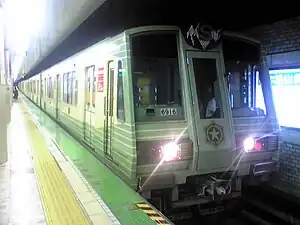Sapporo Municipal Subway 6000 series
The Sapporo Municipal Subway 6000 series (札幌市交通局6000形) was a DC electric multiple unit (EMU) rubber-tyred metro train type operated by Sapporo Municipal Subway on the Tōzai Line in the city of Sapporo, Japan, from June 1976 to August 2008.[1]
| Sapporo Municipal Subway 6000 series | |
|---|---|
 Set 6016 in July 2008 | |
| In service | June 1976 – August 2008 |
| Manufacturer | Kawasaki Heavy Industries |
| Constructed | 1975 – 1982 |
| Entered service | 10 June 1976 |
| Scrapped | 2002 – 2008 (144 vehicles |
| Number built | 168 vehicles (24 sets) |
| Number in service | 24 vehicles (8300 series) |
| Number scrapped | 144 vehicles |
| Formation | 7 cars per trainset |
| Fleet numbers | 6101-6124 |
| Capacity | 870 (346 seated) |
| Operator(s) | Sapporo Municipal Subway |
| Line(s) served | Tōzai Line |
| Specifications | |
| Train length | 180 m (590 ft 7 in) |
| Width | 3.08 m (10 ft 1 in) |
| Height | 4.055 m (13 ft 3.6 in) (61xx cars) 3.915 m (12 ft 10.1 in) (62xx/64xx/69xx cars) 4.065 m (13 ft 4.0 in) (63xx/66xx/83xx cars) |
| Floor height | 1.33 m (4 ft 4 in) |
| Doors | 3 pairs per side |
| Maximum speed | 70 km/h (43.5 mph) |
| Traction system | Chopper control + Reverse conducting thyristor Variable frequency (IGBT) (83xx cars) |
| Acceleration | 3.5 km/(h⋅s) (2.2 mph/s) |
| Deceleration | 4.0 km/(h⋅s) (2.5 mph/s) (service) 4.8 km/(h⋅s) (3.0 mph/s) (emergency) |
| Electric system(s) | 1,500 V DC |
| Current collector(s) | Overhead conductor |
| Braking system(s) | Regenerative braking |
| Safety system(s) | ATC |
| Track gauge | (Rubber tyre) |
Design
The trains are built by Kawasaki Heavy Industries and use chopper control with a reverse conducting thyristor. The 8300 series cars that were inserted later used a variable-frequency drive, provided by either Mitsubishi or Hitachi. Due to the use of both chopper-controlled and variable frequency drive-controlled cars in the 6000 series, this gave the 6000 series a unique sound on propulsion.
Formations
The 6000 series trains are formed as seven-car sets as shown below.
| Car No. | 1 | 2 | 3 | 4 | 5 | 6 | 7 |
|---|---|---|---|---|---|---|---|
| Designation | Mc2 | Tc2 | T | M | M2' | Tc1 | Mc1 |
| Numbering | 6100 | 6200 | 6300 | 6400 | 8300 | 6600 | 6900 |
| Weight (t) | 25.5 | 23.2 | 23.5 | 27.3 | 23.5 | 25.3 | |
| Capacity (total/seated) | 116/44 | 126/50 | 126/52 | 134/52 | 126/52 | 116/44 | |
Interior
Passenger accommodation consists of longitudinal bench seating throughout, with a wheelchair space in each car. The 8300 series cars that were introduced later have an interior that is very similar to that of the 8000 series cars.
History
The first prototype cars were manufactured in 1975, and had a shape remarkably similar to that of the older 2000 series, followed by 20 more full-production sets in 1976.[2] The trains began operation on 10 June 1976 with the opening of the stretch between Kotoni Station and Shiroishi Station and originally operated as four-car sets; however, when the stretch between Shiraishi and Shin-Sapporo Station opened on 21 March 1982, four more sets were delivered, this time as six-car sets, with the rest of the 4-car sets having additional cars added to make up a 6-car consist.
A seventh car known as the 8300 series was added to all sets starting from March 1999; the 8300 series were designed as such so that they could continue to be useful even when the 6000 series was completely withdrawn. This would prove true as the 6000 series would slowly be retired from 2002 onwards, as the new 8000 series cars began to replace them. The last remaining set, 6116, remained in service until 30 August 2008, after which it was retired.[3] The 8300 series cars were later modified and fitted into various 8000 series sets and are still being used today.
The 6000 series was one of the two recipients of the 1977 Laurel Prize.[4]
 Prototype set 6101 in September 2007
Prototype set 6101 in September 2007
References
- 地下鉄(高速電車)の概要 [Subway (high-speed) overview] (in Japanese). Japan: Sapporo Municipal Subway. Retrieved 15 November 2017.
- 6000形の車両紹介 [6000 series introduction]. SCSIS (in Japanese). Japan. Retrieved 15 November 2017.
- 地下鉄6000形「引退」 [6000 series "Retirement"]. Hokkaido Shimbun (in Japanese). Japan. Retrieved 15 November 2017.
- 1977年 ブルーリボン・ローレル賞選定車両 [Selected vehicles for the 1977 Blue Ribbon Award and Laurel Prize]. Japan Railfan Club (in Japanese). Japan. Archived from the original on 18 June 2009. Retrieved 15 November 2017.
External links
This article incorporates information from the corresponding article on the Japanese Wikipedia.